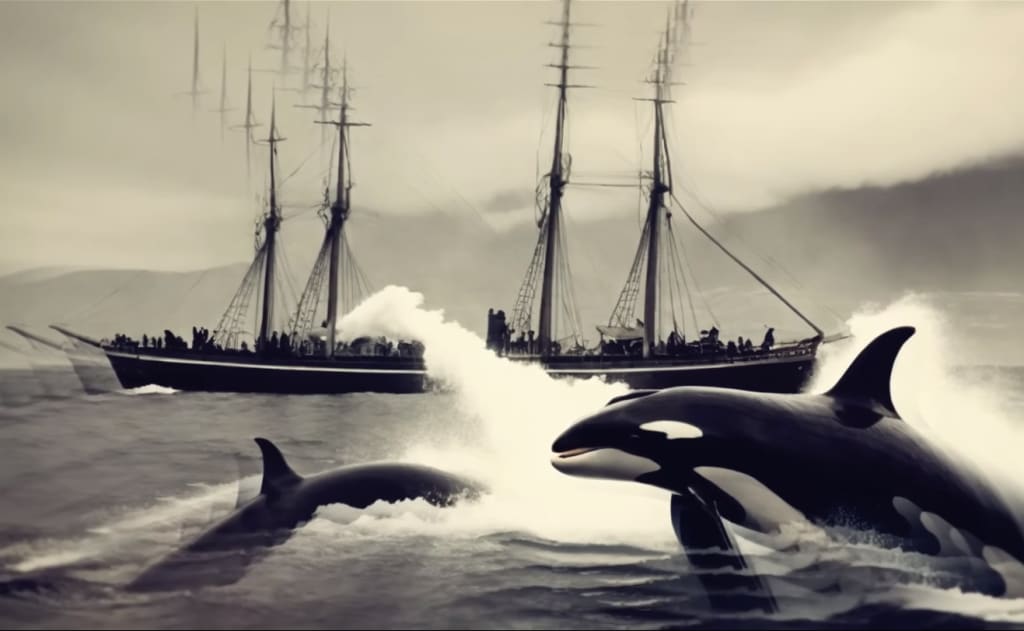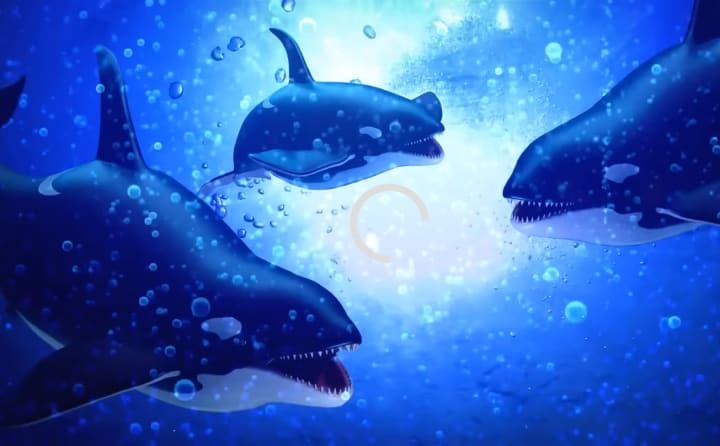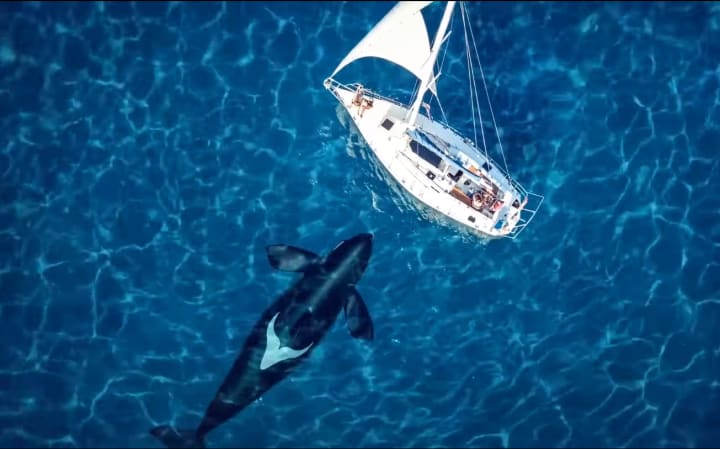Orcas are attacking boats!
They are getting mad...

Orcas are considered some of the mightiest predators on Earth. One look at their elegant black and white appearance, and you'll immediately recognize them. These marine mammals are not just strong; they're also super smart and social. They have an incredible knack for communicating with each other through a wide range of noises. What's fascinating is that each orca pod has its own unique sounds that its members can recognize, even from a distance. It's like they have their very own secret language.
When it comes to hunting, orcas are highly skilled. While they prefer chilly coastal waters, you can find them all around the globe, from the polar regions to the equator. As the kings and queens of the food chain, orcas have a diverse palate. They enjoy feasting on fish, penguins, and other marine mammals like seals, sea lions, and even whales. They've got some serious teeth too, measuring up to 4 inches long.

Now, there's something really neat about orcas: they're expert hunters, and they do it in groups called pods. A pod can consist of up to 40 orcas, forming a very effective hunting team. Interestingly, there are distinct types of pods: resident and transient. Resident pods are more into fish, while transient pods have a taste for marine mammals. But no matter what type of pod they belong to, all orcas have one thing in common: they are master collaborators. They work together using smart hunting techniques that are often compared to the teamwork of wolf packs.
When it comes to family matters, orcas take their roles seriously. Mothers are incredibly protective of their little ones, and often other adolescent females pitch in to help with the care. Mothers give birth every few years after a really long 17-month pregnancy. They usually have just one baby at a time. Eventually, as they grow up, they'll become more independent and venture out on their own. However, in some cases, the young orca may choose to stick with the pod it was born into for life. In the wild, orcas live in tight-knit family groups, forming strong bonds and sharing a unique culture that is passed down from generation to generation.
Research has shown that their social structure is decidedly sophisticated. Despite their beauty and intelligence, orcas are causing somewhat of a stir among sailors. Unbelievably, they have actually sunk boats. What's even more interesting, in a dangerous kind of way, is that they seem to be teaching their friends to do the same. According to experts, it all started with one upset orca. This poor soul experienced what they call a critical moment, and it triggered a whole new behavior. And now, this behavior is expanding among the orca population through social learning.
The latest incident occurred off the coast of Spain in the Straits of Gibraltar. A yacht had an unfortunate encounter with three orcas. The skipper of this vessel described how the little orcas shook the rudder, while the big one repeatedly rammed the ship with all its might. The astonishing part is that the smaller orcas actually imitated the techniques of the larger one. With a slight run-up, they too slammed into the boat. It's like they were training with the master. But that's not all. Just two days before this incident, a group of six orcas ran into another sailboat in the same area. One of the orcas, a mother, seemed to be teaching her calf how to charge into the rudder.

Now, you might be wondering why these boat-sinking shenanigans are happening more frequently. It turns out that reports of aggressive orca encounters off the Iberian Coast have been popping up since 2020. And according to a study published last year, the attacks follow a pattern: the orcas approach the boat from the stern, strike the rudder, and then lose interest once the boat comes to a halt. There's some good news though. Despite the increasing number of interactions between orcas and boats, most of them have been harmless. In fact, out of over 500 recorded interactions, only three boats have been sunk. So the chances of your boat meeting its watery end at the hands or teeth of an orca are pretty slim.
Let's trace the origin of this whole phenomenon. Experts believe that it all started with an orca called White Gladus. Poor White Gladus must have had a seriously rough time, maybe a collision with a boat or getting tangled up in some fishing gear. This traumatic event somehow flipped a switch in her behavior, and she began the whole physical contact with the boats thing. Remember when I said orcas are extremely social creatures? They are quick learners and great imitators. So once White Gladus started her boat-bumping thing, the rest of the orcas caught on, and just like that, the behavior spread among the orca population.
You might be wondering why orcas would even bother with this risky behavior. Well, the experts think that the orcas perceive it as advantageous. Despite the potential danger of crashing into moving boats, it could be that they find it absolutely thrilling or maybe even a bit of a game. Orcas are incredibly curious and playful creatures, after all. Another theory is that this behavior might not be as aggressive as it seems. Some researchers believe it could be more of a playful fad among these creatures. You know, like when a few friends start doing something cool, and then everybody wants to join in on the fun. Maybe it's their way of entertaining themselves and breaking the monotony of ocean life. However, as the number of incidents continues to rise, concerns are growing, and not just for the sailors out there.
The Iberian Orca subpopulation is already critically endangered, and this boat-bopping trend could pose a severe issue for them. According to the latest census, there are less than 40 Iberian orcas left in the wild. That's a dangerously small number. So if these boat encounters persist or become more intense, it could seriously jeopardize the safety of both sailors and the orcas themselves.
However, it may just be the boats they don't like. That's because orcas have never attacked humans in the wild. They have even been known to approach and play with humans. Orcas are incredibly curious creatures and seem to enjoy interacting with us. They've been seen swimming alongside humans, bringing them toys, and even chasing boats in their way. Some individual orcas have even developed friendships with specific humans over time.
Here's one fascinating incident that occurred in a coastal Alaskan village: a group of children were having a snowball fight when a pod of orcas decided to join in the fun. They broke off a piece of drift ice and began tossing it around in the air, much to the delight and amusement of the children.
Now, you might wonder if orcas have ever saved humans from dangerous situations. Well, there are very few recorded cases of orcas rescuing unfamiliar humans. There have been instances where they have come to the aid of humans they know. It's worth mentioning a remarkable occurrence that took place in Eden, Australia: a group of whalers found themselves in grave danger after their boat capsized, leaving them at the mercy of shark-infested waters. Incredibly, a pod of orcas led by a male known as Old Pal shielded the whalers from the sharks and kept them afloat until they were rescued. This demonstrates the protective nature of orcas, even towards humans.
There are several theories as to why orcas do not attack humans. One possibility is that they recognize that we are not their natural prey. These creatures prefer to feast on particularly nutritious and fatty foods like sea lions or salmon, whereas humans simply don't provide the same nutritional value. But is this the only reason? Other apex predators like sharks may occasionally mistake humans for seals and attack them.
However, in the rare cases where orcas have mistaken humans for prey during a hunt, they immediately stop the chase once they realize their mistake, without causing any harm. Experts believe this is due to the high intelligence and empathy of orcas.
About the Creator
Anthony Rockwell
Im just interested in weird things and strange stuff that we don't see everyday
Enjoyed the story? Support the Creator.
Subscribe for free to receive all their stories in your feed. You could also pledge your support or give them a one-off tip, letting them know you appreciate their work.






Comments
There are no comments for this story
Be the first to respond and start the conversation.